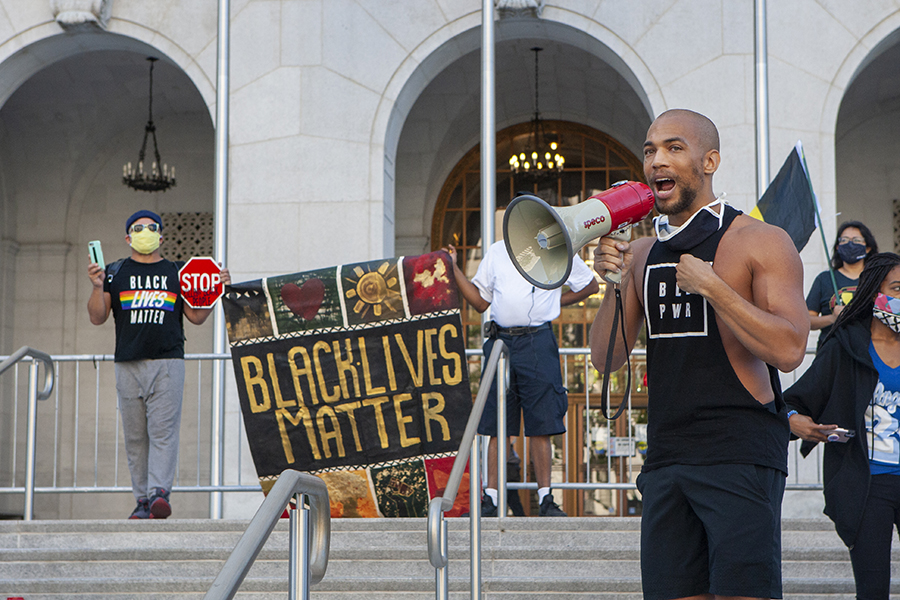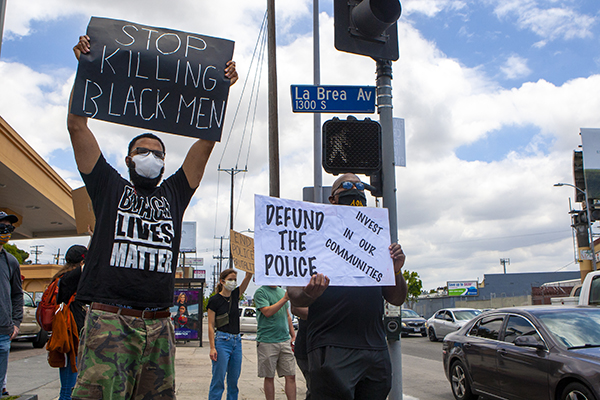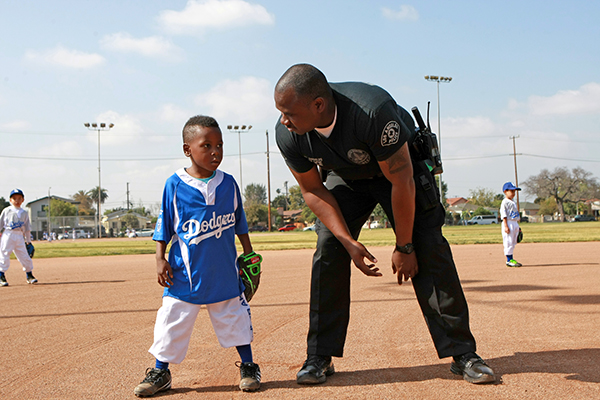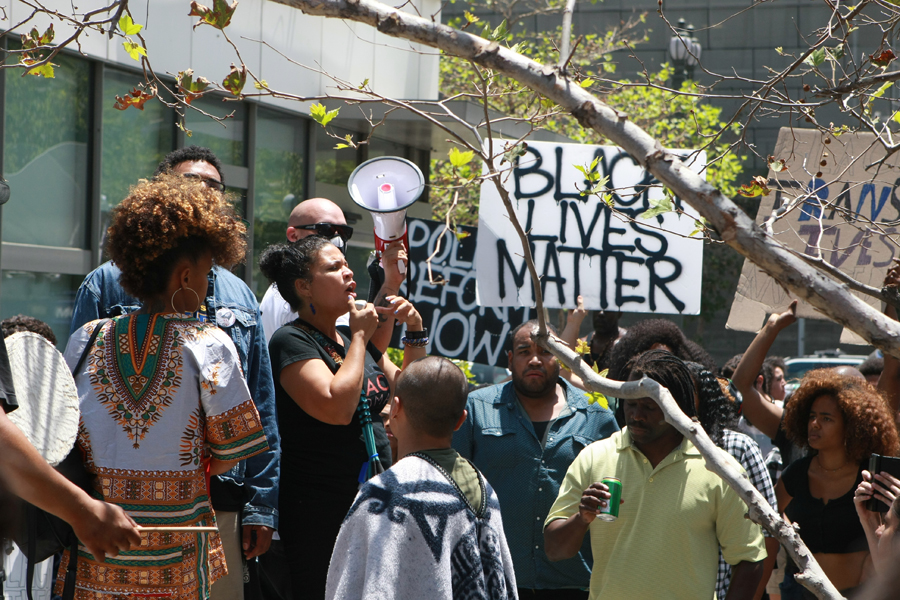Protesters in Los Angeles want justice, a reallocation of public safety funds, and D.A. Jackey Lacey to prosecute law enforcement agents.
By Jason Lewis
Black people have been protesting law-enforcement agencies across the nation for decades. The fight for fair treatment has intensified over the last several years, with the boiling point being the killing of George Floyd under the knee of Minneapolis police officer Derek Chauvin on Monday, May 25.
Protests broke out in cities across the country and even on other continents. In Los Angeles, where there has been a long history of conflict between Black communities and law enforcement agencies, many community activists and protesters have called for police departments to be defunded and for Los Angeles County District Attorney Jackie Lacey to be ousted from her position for not bringing charges against any law enforcement agents who have shot and killed Black people.
No Justice, No Peace!
The slogan “No Justice, No Peace!” has been used at protests against police brutality for years, but outside of the 1992 Los Angeles Uprising after Los Angeles Police Department (LAPD) officers were acquitted on chargers for beating Rodney King, the chant has not had much action behind it. That dramatically changed during the protests that seek justice for Floyd and other Black people who have been killed by law-enforcement agents in recent years.
While the protesting has been peaceful, in many cities rioting and looting has gone alongside emotional demonstrations. Many critics of the movement have focused on unlawful behavior, while the protesters have continued to passionately express their frustrations on a daily basis.
“I’m fed up,” yelled HBO Insecure actor Kendrick Sampson at a rally in downtown two days after Floyd’s death. “I’m sure y’all are fed up and I know y’all are tired of posting ‘rest in power’ and ‘rest in peace.’ We don’t want to rest any more. We want to live and we want to thrive!”

Sampson addressed a crowd of several hundred protesters a rally in front of Lacey’s office. The protest was organized by Black Lives Matter-Los Angeles (BLM-LA) and Build Power, of which Sampson is the founder. The protest was to demand police accountability and to oust Lacey.
“The American legal system, there’s no justice in it,” Sampson said. “The American legal system was built to protect elite Whites from the people that they stole land from, and the people that they stole, trafficked, commodified — Black folks — and used to work the land and benefit from their labor. That is what the system is. So when we wonder why there is not justice in it, it’s not broken. It’s working exactly how it was meant to work.”
Defund the police

One of the major demands that protesters are pushing for around the nation is defunding the police. On one end that can mean disbanding the police completely and replacing it with a different form of public safety, and on another end it can simply mean reallocating a large portion of law enforcement’s budget and using it for community-based programs that address education, employment, gang prevention and intervention, drug use, and housing.
Many activists will argue that a larger police presence merely treats the symptom of the problem, which is crime. But it does not treat the root of the problem, which is poverty. Low-income areas often lack adequate education and employment opportunities, and there are higher levels of trauma from mental illness. These issues lead to higher crime rates. Law enforcement being tougher on crime, which President Donald Trump advocates, does not address these issues.
“What we get is jail. What we get is more law enforcement. That’s what the system’s solution has been for Black folks,” said community activist Aqeela Sherrills, principal partner of the Reverence Project. He made these comments in 2015 after an emergency meeting at Hamilton United Methodist Church in South Los Angeles to discuss the surge in street violence in Black communities.
“Every time there is violence, the solution is more police,” he said. “We haven’t even looked at the root of the cause of why violence is spiking. Our tax dollars are locked up by law enforcement. If gang intervention and prevention were properly funded, there would be no spike in violence in the city. They would be able to create jobs and entrepreneurial opportunities for a lot of young Black and Latinos who are living in our neighborhoods. It would strengthen organizations so that they would have greater capacity to hire and train the next generation of interventionists.”
Sherrills pointed out that in the city of Los Angeles, the budget for the LAPD has continually increased over the past decade, but the funds for community-based programs has stayed the same.
“White folks in this country get a lot more access to healing technologies and recovery services,” he said. “Whereas Black folks are only eight percent of the population of the state of California, we lead in every single category of victims of violent crime in the state. Black people, we are the poster child for crime victims and crime survivors in this country. But we don’t get our fair share of resources and support services. The thing is that the system is not doing enough.”
Melina Abdullah, co-founder of BLM-LA, shares similar views as Sherrills. In 2016 she led a 51-day sit-in outside at City Hall in an attempt to force Mayor Eric Garcetti to fire then LADP Chief Charlie Beck. BLM-LA was protesting the LAPD after an officer-involved shooting.
While Abdullah was spearheading the movement to oust Beck, she discussed solutions to the issues within minority communities — solutions that do not involve the law enforcement.
“We do not believe that they are the best organization to deal with the issues that we want to have dealt with,” she said. “So at this point they have set up a very adversarial relationship. My entire lifetime, and I was born in the ‘70s, it has been one where police treat Black communities as if they’re an occupying force and we’re enemy combatants. So I’m not interested in talking with them about community solutions. I’m interested in developing indigenous community solutions; meaning ones that we identify for ourselves.”
Abdullah wants to see fewer police officers and more community workers tackling issues within the community, and she is looking for help from the city.
“We need resources,” she said. “We need intervention and prevention workers. You can hire three interventionists, if we take the Gang Reduction and Youth Development (GRYD) workers, for every LAPD officer. We’d like that money to be shifted. We know GRYD workers do a good job. We know interventionists are very effective. We would like to see money go there. We would like to see money go into mental health resources; and that be the thrust of where we put our energy, and focus, and budget as Los Angeles. Rather than funding police to do a job that they are not qualified to do.”
Like Sherrills, Abdullah wants to see the city spend less money on law enforcement, and spend more money on people who are more qualified to treat the root of the problem.
“We spend 54 percent of our city budget on LAPD,” she said. “We need people to walk kids to school. We need people to do the community work; to clean the streets. You don’t need a badge and a gun to do that work. In fact, it makes you less effective. So let’s put the money where every study in the world shows that the most effective use of funds is, spending it on resources and livable wage jobs for the people. People commit crimes because they don’t have resources. Let’s get to why people commit crimes. If you don’t have a job, you’re going to have to steal your food. If you don’t have mental health resources, you may behave in ways that seem criminal when you really need mental health treatment.”
Greg Akili, an organizer with Black Lives Matter L.A., said that Mayor Garcetti was trying to fast track a budget that included increased funding for the LAPD.
“This police force, which has not held any officer accountable for killing Black people, does not deserve to be rewarded with more money,” he said. “We have a number of positions about why we think we need to invest in our communities and our people, and not in the LAPD. We have the largest homeless problem in the country. We should be looking at how we can redirect money toward addressing that issue. Over 45 percent of those homeless are Black.”
During a Facebook Live meeting hosted by BLM-LA, Pete White from the Los Angeles Community Action Network pointed out that in 2015, the city spent $100 million to address the homeless issue, with $87 million of those dollars going to the LAPD for arrests, skid row patrols and mental health interventions.
Akili believes that legitimate programs that are run by Black people can address the needs of the community. BLM-LA has partnered with 14 other social justice organizations, including Community Coalition, Brotherhood Crusade, Social Justice Learning Institute, and Southern Christian Leadership Conference of Southern California, to form PUSH L.A., “Reimagine, Protect & Serve.” This coalition has created the “People’s Budget.” This budget looks to invest in universal needs such as housing security, public health/health care, and mental health. They are also looking to divest from traditional forms of policing.
The Mayor’s proposed budget would have allocated $1.9 billion to the LAPD, which is nearly 54 percent of the budget. In the people’s budget, only 5.72 percent of the funds would be allocated to the LAPD.
“Our goal is to have that money to be re-invested into youth development, healing centers, economic development centers that work with small Black-owned businesses, labor, and mental health,” said Charisse Bremond, president and CEO of the Brotherhood Crusade.
The Brotherhood Crusade has a YouthSource Center which improves educational and employment opportunities for 14-21 year old South Los Angeles youth who are unemployed and out of school or at-risk of dropping out of school.
“When you look at youth development, the mayor has had great success with the GRYD program,” Bremond said. “We know that when we have students in our program, we’re not only supporting them with wraparound services, we’re supporting them with mental health support. We’re supporting the whole family. When you look at amplifying the work on the prevention side, crime would continue to go down. Young people need to have the ability to grow and thrive.
“We’re one GRYD provider in the south zone. How does that work when you have hundreds of thousands of youth who need services? So we are mandating that money is moved to youth development.”
Since the protests have intensified since Floyd was killed, Mayor Garcetti has pledged to take $150 million out of the LAPD’s budget, and another $100 million from other departments, and direct those funds to youth jobs, health initiatives and “peace centers” to heal trauma.
“We do not want that $100 million to come from any other department” Bremond said. “The $250 million should come from the LAPD’s budget.”
While the LAPD and law-enforcement agencies around the nation are dealing with protesters calling for smaller budgets, the LAPD has received a very positive review on their community policing program. A recent UCLA study finds that crime declines and trust increases when officers work alongside residents to build relationships.

The LAPD has community partnerships in pubic housing developments in Watts and in the neighborhood of Harvard Park in South Los Angeles. As part of the LAPD program, extra effort is made to bridge communication between officers and residents; many of whom have deep-seated distrust of the police.
“Because it's community-based policing here, our goal is to bridge the gap (between the LAPD and the community),” said LAPD officer Marcus Whitehead. “To put a Band-Aid on the wounds from the past. Our goal is to reestablish the relationship with the community and getting them to know us as humans instead of just police officers.”
While the LAPD’s community partnerships have seen success, many community activists are still skeptical about partnering with a department that, as Abdullah put it, they have an “adversarial relationship” with and they do not want to pay “police to do a job that they are not qualified to do.” Activists are concerned that portions of the $250 million LAPD budget cut will be funneled back to the LAPD through the community partnership program.
D.A. Jackie Lacey
BLM-LA and other community organizations who seek fair treatment from law enforcement have held protests every Wednesday outside of Lacey’s office in the Hall of Justice in downtown on Spring Street and Temple Street.
Dating back to 2013, Lacey’s first full year in office, 330 people have been killed by law-enforcement agents in Los Angeles County, which is the most in the nation. Lacey has not charged an LAPD officer in any of those cases, and she has only brought charges against one Los Angeles Sheriff’s Department officer.
“We have to hold police accountable,” Akili said. “First they have to lose their jobs and second they have to be prosecuted.”
Lacey is heading into a November election runoff with George Gascón for her L.A. County District Attorney office. People who are dissatisfied with Lacey want her voted out and replaced with a D.A. who will prosecute police officers when needed.
“Who ever the D.A. is for this city, they need to prosecute when law enforcement has done things that are against policy,” Bremond said.
Many activists want to remove the county D.A’s abilities to prosecute police officers and have an independent office take on that task. The D.A.’s office works closely with law enforcement agencies, and police unions also donate large sums of money to the campaigns of candidates running for district attorney.
“We think that it (prosecuting police officers) should be done by the state because they don’t have that incestious relationship (with the D.A.’s office),” Akili said. “You have to wall off the prosecutors from the police. And you have to make sure that there are strict guidelines to make it effective. Right now, the district attorney depends too much on the police. And the district attorney gets millions of dollars from police organizations to run for re-election. They wind up being co-workers, and then the district attorney won’t prosecute killer cops.”
In an interview with Spectrum News 1, Lacey refuted the claims that her office does not prosecute police officers.
“For the last seven years, we've actually prosecuted 21 officers for excessive force,” she said. “I’m the only D.A. in the state who has a pending officer-involved shooting case notwithstanding that I've been given no credit for this.”
Lacey’s office creates reports on every officer involved shooting, and she encourages people to review them before they have knee-jerk reactions from news reports.
“I'm angry over a lot of injustices that I see, but I do believe that anger can cloud your judgment,” she told Spectrum News 1. “We put out a rather lengthy explanation every time we decline a case, and you know what people tell me? ‘I don’t have time to read it.’ Well, the facts matter. They matter. And I would encourage anyone to look at the documents we put out, look at the facts we put out, and don’t just let anybody throw numbers at you and say, ‘See, this is the problem.’”
Continuing the protest

Eventually the massive demonstrations will slow down, but that does not mean that people who are passionate about Black lives should disengage from the movement like it was some sort of fad. Akili encourages people to join community organizations that are fighting for change on a continual basis.
“Just individual and independent action, while it’s meaningful, it’s not sufficient,” he said.
BLM-LA holds protests every Tuesday at the Los Angeles City Police Commission meetings and every Wednesday in front of Lacey’s offices. They also work with other organizations to push for legislative change.
“While you may see us in front of these crowds now and doing stuff now, we have been consistently, over the past six years, challenging the L.A. Police Commission every Tuesday,” Akili said. “Many of us have been arrested there. We have been challenging Jackie Lacey to prosecute killer cops. We’ve been out in front of her office for three years now.
“It’s not what we do in these marches. It’s what we do in-between.”
Akili also encourages people to have demands and work to have those demands met.
“Having demands is how society changes,” he said. “Society doesn’t change just through voting. Society doesn’t just change just through good ideas. Society doesn’t change just through people being dissatisfied. Society changes because we have a set of demands. And we need to keep fighting for and advancing those demands.”








